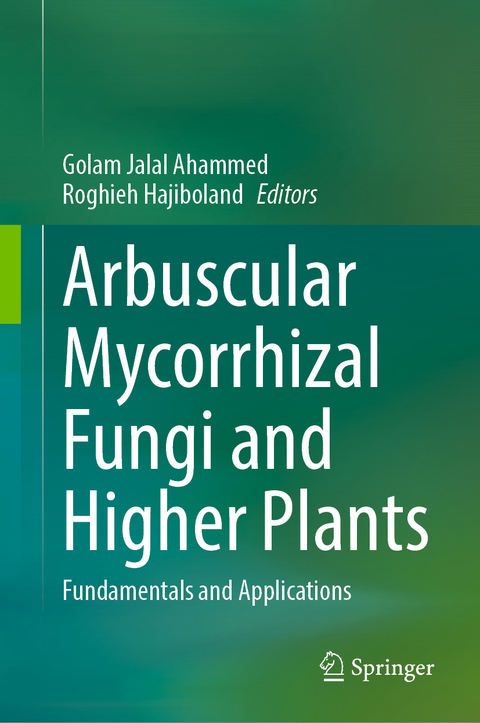
Arbuscular Mycorrhizal Fungi and Higher Plants
Springer Verlag, Singapore
978-981-99-8219-6 (ISBN)
Dr. Golam Jalal Ahammed is an Associate Professor at the Department of Horticulture, College of Horticulture and Plant Protection, Henan University of Science and Technology, Luoyang, China. Dr. Ahammed received a Ph.D. in Olericulture with a major focus on Plant Stress Physiology and Hormonal Regulation in 2012 from Zhejiang University, China. Afterward, he completed two consecutive postdoctoral programs at the Institute of Pesticide and Environmental Toxicology and the Institute of Crop Science of Zhejiang University. His major research interests include plant stress physiology, phytohormones, climate change effect on plants, biological control of plant diseases and environmental pollution. Dr. Ahammed authored over 160 peer-reviewed papers in internationally reputed journals. He is a Senior Editorial Board Member of Scientific Reports and an Associate Editor of BMC Plant Biology, AoB Plants and the Journal of Plant Growth Regulation. Dr. Roghieh Hajiboland is a Professor at the Department of Plant, Cell and Molecular Biology, University of Tabriz, Tabriz, Iran. Dr. Hajiboland received a Ph.D. in Plant physiology from the University of Hohenheim, Germany in 2000. Afterward, she started working as academic staff in the University of Tabriz and completed two international research programs through working as visiting scientist in the Faculty of Biosciences, Autonomous University of Barcelona, Spain in 2009 and in the Faculty of Agriculture and forestry, University of Helsinki in 2010. Her major research interests include plant nutritional physiology, plant stress physiology and plant-microbe interactions. Dr. Hajiboland authored over 150 peer-reviewed papers in internationally reputed journals.
Chapter 1. Introduction to arbuscular mycorrhizal fungi: characteristics, functions, and applications.- Chapter 2. Non-host plant species: definition, description and mechanisms of interaction with arbuscular mycorrhizal fungi.- Chapter 3. Interactions between arbuscular mycorrhizal fungi and other microorganisms in the rhizosphere and hyphosphere.- Chapter 4. Signaling events during the establishment of symbiosis between arbuscular mycorrhizal fungi and plant roots.- Chapter 5. Arbuscular mycorrhizal fungi and plant secondary metabolism.- Chapter 6. Arbuscular mycorrhizal fungi in acquisition of essential plant nutrients and mitigation of nutrient deficiency.- Chapter 7. Mechanisms of arbuscular mycorrhizal fungi-induced drought stress amelioration in plants.- Chapter 8. Arbuscular mycorrhizal fungi in plant tolerance to organic pollutants.- Chapter 9. Managing foliar diseases of crop plants by beneficial arbuscular mycorrhizal fungi.- Chapter 10. Applications of arbuscular mycorrhizal fungi in controlling root-knot nematodes.- Chapter 11. Glomalin and carbon sequestration in terrestrial ecosystems.- Chapter 12. Arbuscular mycorrhizal fungi in organic versus conventional farming.- Chapter 13. Arbuscular mycorrhizal fungi under intercrop and crop rotation systems.- Chapter 14. Arbuscular mycorrhizal fungi applications for sustainable agricultural systems.
| Erscheinungsdatum | 17.01.2024 |
|---|---|
| Zusatzinfo | 36 Illustrations, color; 3 Illustrations, black and white; XX, 340 p. 39 illus., 36 illus. in color. |
| Verlagsort | Singapore |
| Sprache | englisch |
| Maße | 155 x 235 mm |
| Themenwelt | Naturwissenschaften ► Biologie ► Botanik |
| Naturwissenschaften ► Biologie ► Genetik / Molekularbiologie | |
| Naturwissenschaften ► Biologie ► Mikrobiologie / Immunologie | |
| Naturwissenschaften ► Biologie ► Mykologie | |
| Weitere Fachgebiete ► Land- / Forstwirtschaft / Fischerei | |
| Schlagworte | abiotic stress • Agro-ecology • Biofertilizers • biotic stress • Inter-organisomal communication • plant hormones • Plant nutrition • sustainable crop production • Systemic resistance |
| ISBN-10 | 981-99-8219-7 / 9819982197 |
| ISBN-13 | 978-981-99-8219-6 / 9789819982196 |
| Zustand | Neuware |
| Haben Sie eine Frage zum Produkt? |
aus dem Bereich


